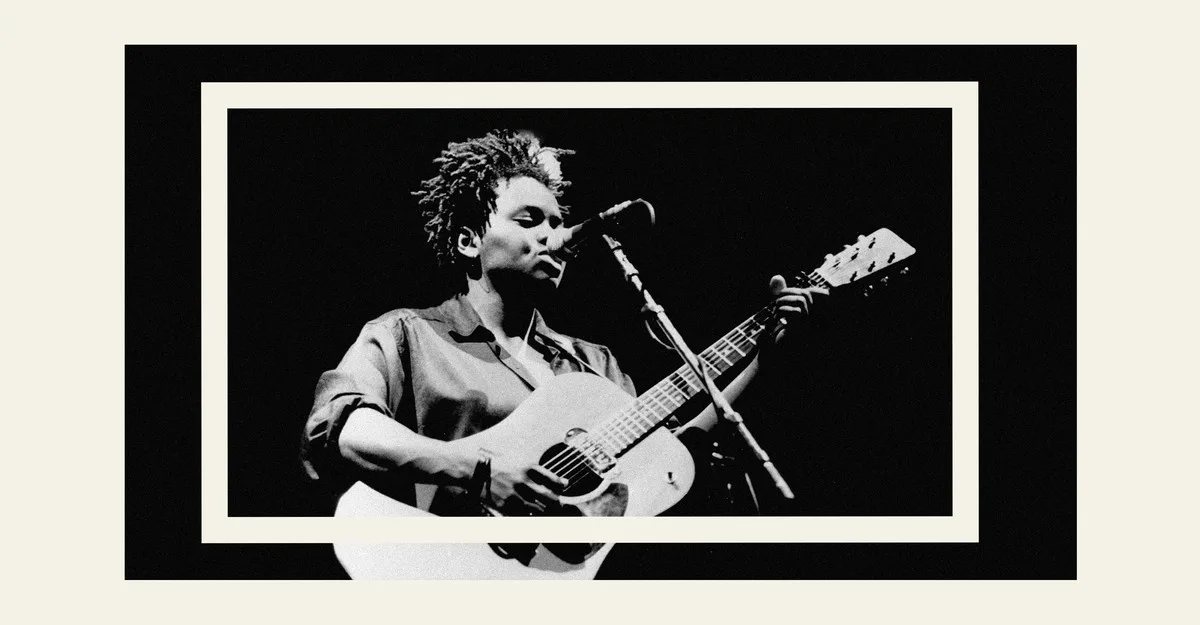
Welcome to Up for Debate. Each week, Conor Friedersdorf rounds up timely conversations and solicits reader responses to one thought-provoking question. Later, he publishes some thoughtful replies. Sign up for the newsletter here.
In a previous newsletter about a country-music controversy involving the artist Tracy Chapman’s song “Fast Car,” I asked readers:
“What is the most constructive way for the press to cover race if its objectives include accurately informing citizens about the past and the present––no matter how awful or uncomfortable––and refraining from framing the news in ways that are needlessly polarizing or essentialist?”
Replies have been edited for length and clarity.
Zachary harkened back to the coronavirus pandemic:
Your question brought to mind this study, which found that highlighting racial disparities due to COVID-19 made white Americans less fearful of COVID-19, and thus less likely to support policies meant to address it. If the press aims to cover race in a way meant to be constructive in solving problems, it should take care to keep all audiences emotionally invested. If, for example, a story about police abuse focuses on abuse perpetrated against African Americans, many non-Black Americans will infer that police abuses are not a problem they should be personally concerned about. They will sympathize, but most will move on—the same way we all do for the many horrible things regularly reported in the press, once we gather that the problem does not personally affect us.
While police abuse against African Americans is disproportionate, the point to emphasize is the level of abuse that American police get away with. Even white Americans disproportionately suffer at the hands of the police compared with our peer countries. The manner in which Daniel Shaver was killed by police is absolutely terrifying, and it was recorded by body cameras. Yet his case did not provoke a national reaction. His execution makes clear that the color of your skin will not save you from being a victim of the police—a point the press should emphasize whenever a similar shooting happens again. Had the press lionized cases like Shaver’s, police reform in America today might look different, with Americans of all races benefiting.
Jim is Canadian. He writes:
I recognize that Black and LGBTQ artists face barriers in contexts like country music. But when “Fast Car” came out, I loved it and bought the album immediately, having no idea what colour Chapman’s skin was, and I still don’t care. Race and sexual orientation mean nothing to me as a fan. And I find it exhausting to constantly filter my perceptions of culture through the American race conflict that barely registers here, where our greatest shame is treatment of Indigenous people. There is an arrogance to the view that all things in the world must be examined through the American race conflict. Fraught relationships among ethnicities abound worldwide, but because of American cultural hegemony, all we ever hear about is yours. Thoughtful analysis of the American race conflict is important and worth examination, but the “Fast Car” story is not the place.
Dominic is a working-class man in his 60s. He writes:
I find myself in the middle to slightly conservative with most political issues. I have always liked “Fast Car,” but never really listened to it as much as I have lately, and I have to tell you, I have more appreciation now for Tracy Chapman than before. I heard Luke Combs’s cover of the song, then heard an interview he had given stating that he really felt it was a perfect song. I agree. I have taken the time to read the lyrics and listen to both versions a few more times. I think that it is a perfect song and that he did an outstanding job of covering it, both with feeling and technically. I’m sure Tracy is happy with his performance.
Then I heard the controversy. Of course, a person would have to live under a rock not to know the direction this country has gone the past few years. I find that stirring up racial or gender issues is a way of dumping cold water on a good warm bonfire. It’s what some people in this country do now. Sure, back in 1988, it may have been difficult for a person to make it in country music if they were gay or a person other than white. We will never know if Tracy could have done this, since she apparently didn’t try for country but did make it where she did try, in pop and rock. All of this considered, I do not concern myself with a person’s color or who they choose to love when I am admiring their good work.
“Fast Car” is about hope, disappointment, and what so many of us have experienced. It is for everyone and anyone. We need to enjoy a good song without someone dumping cold water on us.
Lori believes that “it is essential that the press cover racism in America in a factual manner” and that “the feelings of the oppressor” are not “coddled.” She writes:
A main reason that racism is an ongoing cancer is the reluctance of white Americans to step out of their comfort zones and have difficult conversations with people in their lives about racism.
We are encouraged by psychologists and life coaches to set boundaries. However, not enough emphasis is placed upon how to handle what happens next. Often, it gets ugly. People react negatively to criticism. The relationship that you set out to improve is lost. This is what is happening in America regarding race. Victims of ongoing racism (and all of the brutality and anxiety and depression that accompany it) are exhausted and no longer willing to live a life in America without boundary-setting. The people who love people who are the victims of racism (or homophobia, or any other form of bigotry) are also fed up and angry. And there are more and more of us as our society diversifies.
The racists are used to being free to harm people with little or no consequences. We need the press and other influential people to help us set firm boundaries with the racists who want to take this nation back to Jim Crow. We need more vocal voices decrying the evils of racism to overpower the emerging voices of those who continue to promote racism. Americans are effective, on their own, at pushing the crippling sin of racism under the rug or excusing and rationalizing it at every turn. The press must continue to factually report the racism that has held this nation back and prevented it from achieving the kind of enlightened society that 21st-century people should be able to enjoy.
Incidents of racism do not need to be “sensationalized,” for they are usually horrific and ugly in their own right. Report the problems as they are and as you would report stories surrounding gun violence, homelessness, income equality, and any other social menace we tolerate in our country. Remind the reader that the victims of racism go through every other “normal” problem that white people face (such as divorce, job loss, medical crisis, and grief)—but that they do it every day with the backdrop of ongoing racist menacing. The “press” will lose some customers who’ll flock to their own “news sources,” which assist them in propping up their racist attitudes. The media need to live with that, just as the rest of us have lost people in our lives due to the collateral damage of calling out racism. It is imperative that the most powerful voices not silence themselves.
Jim articulates the role of journalism as he sees it:
It is not the press’s responsibility to discern what might be polarizing or essentialist about any given reporting. That’s arrogant and egotistical. I’m sick of this notion that journalists are supposed to be controlling the reactions of readers to cold, hard truths. I look to the press to give me the who, what, when, where, how, and why of any given newsworthy topic, not their ideas for buffering me from any potential of news to offend.
Jaleelah finds fault with those who react strongly against coverage of race in journalism, which she finds valuable even when it pertains to small subcultures:
Do some articles portray race as more salient in some fields than it really is? Certainly. But an opinion piece arguing that contemporary country charts are prejudiced against Black people is a bad example. Just a few years ago, “Old Town Road” was removed from a country chart on the grounds that “it [did] not embrace enough elements of today’s country music.” Billboard has no problem bending the definition of “country” for white artists with southern accents who use pop elements like Auto-Tune, synths, and drum loops. But the second a queer Black man achieved success by incorporating trap elements in his country song, his song was retroactively deemed “not country enough” to “count” as success in that genre.
The subject of racism in country music is not the most important issue in the fight for equality, but it is certainly relevant to people who care a lot about the scene. It is clear that the article generated spirited discussion on the nuances of discrimination in country music and the best way to combat it. What about the people who found it upsetting? Most of the time, I don’t think that negative reactions to observational, non-prescriptive pieces about race are the fault of the author. I think they’re the fault of a system that exists to manufacture outrage in normal Americans. Which outlet is more responsible for making people feel upset: The Washington Post, which published one article about “Fast Car,” or Fox News, which published three separate articles stoking the flames of the controversy?
When writing about race, mainstream news outlets should make sure their articles are free of hyperbolic and outrage-inducing language (the claim that “Chapman would have almost zero chance of that achievement in country music” certainly falls under that category). However, the proposal that they shouldn’t publish articles about race in unusual niches at all should be weighed against the benefits of such articles.
Publishing lots of different perspectives on lots of different subjects—big and small—allows the truth to come to light. Facilitating debate between writers who have different perspectives on the salience of race (and how best to achieve equality) is a better journalistic strategy than asserting that race is simply not salient in certain areas (and that anyone who argues otherwise is needlessly inflammatory).
And articles about niche communities are simply interesting and enjoyable to read for people who are from those niche communities. The racial implications of Mortal Kombat 11’s arcade endings (and the reactions they garnered from gamers) have zero impact on anyone’s real lives. No journalist or blogger should ever pretend otherwise. But I enjoyed reading this blog post about them because I play the game frequently and I enjoy analyzing the motivations of storytellers and the social forces that shape them. Most people don’t want all of their reading to focus on the criminal-justice system. Not everyone wants to pretend race doesn’t exist when they’re reading about their hobbies and interests, and that doesn’t mean they think that talking about race implies it is always severely consequential.
Nancy writes:
I took one absolute truth from your newsletter: “Fast Car” is a beautiful piece of art, no matter who is performing it. Thank you to Tracy Chapman and Luke Combs for bringing it back into my heart after so many years.



